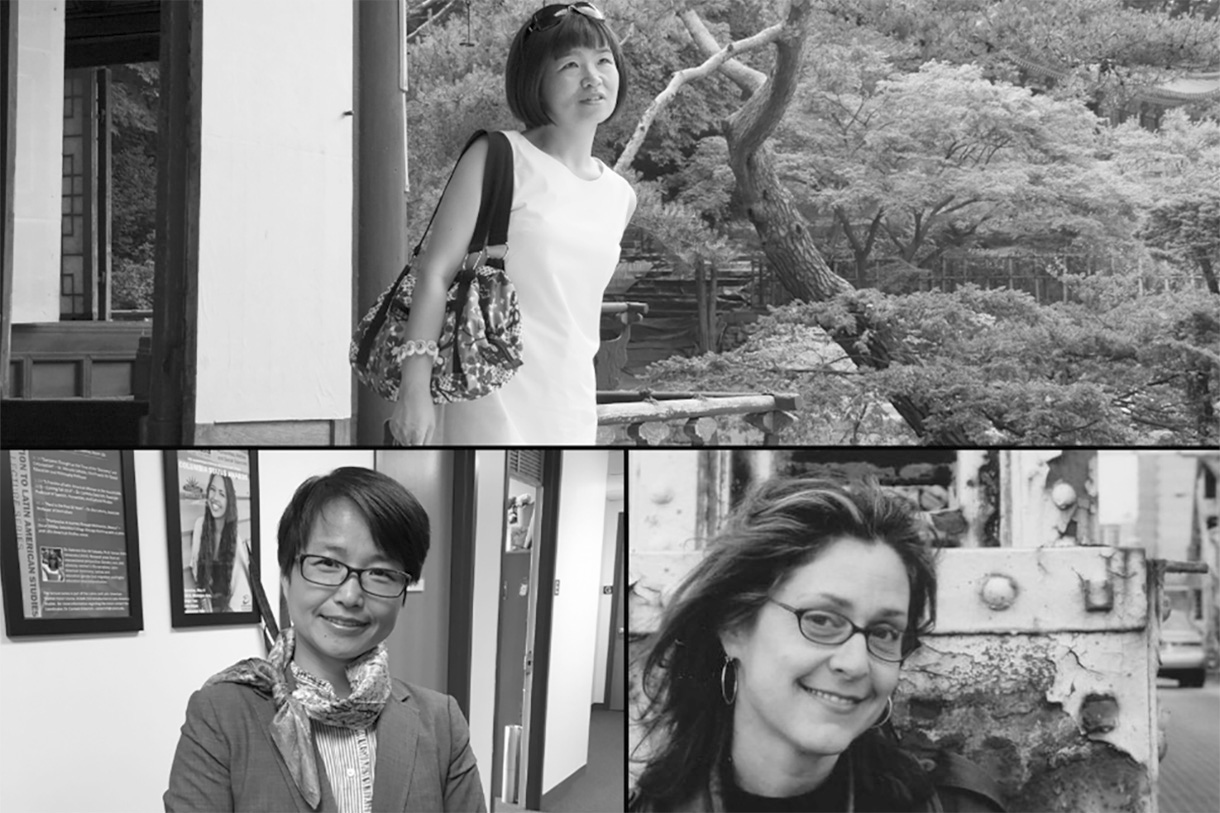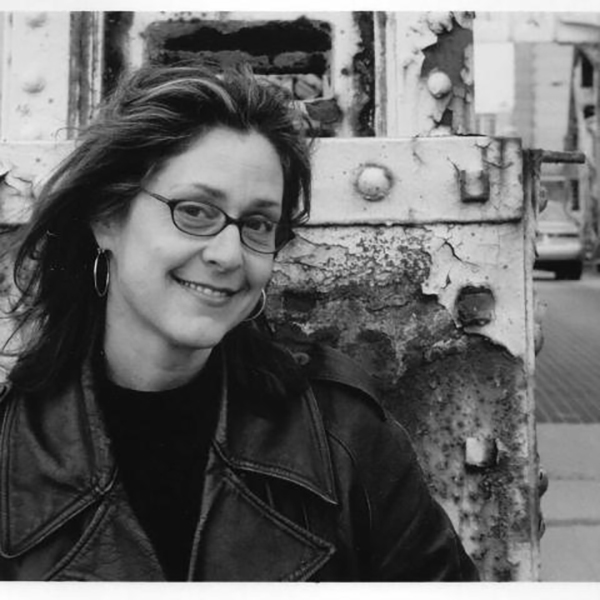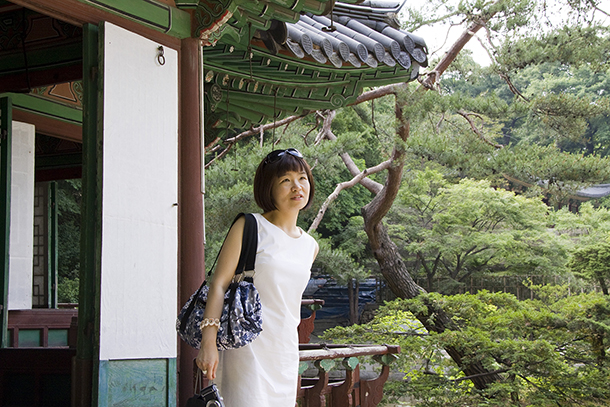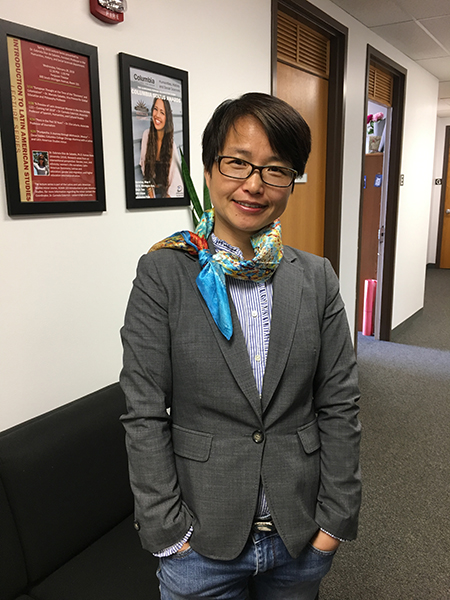Columbia’s Newly Tenured Faculty
 Clockwise from top: Associate Professors Eunju Sohn, Ruth Leitman, and Luying Chen.
Clockwise from top: Associate Professors Eunju Sohn, Ruth Leitman, and Luying Chen. This year, Columbia College Chicago welcomes three faculty members to its tenured ranks. The rigorous six-year tenure process is recognized in their new title of associate professor. Columbia’s newest associate professors are Luying Chen (Humanities, History, and Social Sciences), Ruth Leitman (Cinema and Television Arts), and Eunju Sohn (Science and Mathematics).
“It was a great pleasure to review the tenure dossiers of these three faculty members,” says Senior Vice President and Provost Stan Wearden. “All three are exceptionally accomplished, and all in very different creative and scholarly areas. Reviewing their work not only showed me their individual excellence, but it also strengthened my observation that Columbia College Chicago has an extraordinary faculty. I congratulate our three newly tenured colleagues, and I look forward to seeing them continue to thrive as teachers, scholars, creative art makers, and citizens of the college."
Luying Chen
Humanities, History, and Social Sciences
How did you celebrate upon hearing the news?
I wrote a poem, “Today is Your Day.” Growing up as an older child in my family, I’ve been used to putting others’ needs before my own. But after finding out about tenure, I felt like I had permission to enjoy pure happiness.
What are some challenges you’ve overcome or accomplishments you’ve achieved that you are particularly proud of?
Reaching this milestone, I remember the past two decades since my arrival in the United States. This line in the hymn “Amazing Grace” really speaks to me: “Through many dangers, toils and snares, we have already come.”
Among the challenges I’ve overcome are dealing with the aftermath of censorship of an essay I wrote in spring 2016, “Seventy-Five Hopes;” the imposter syndrome of a first-generation college graduate; and balancing work with caring for my children who, as people of color, encounter challenges unimaginable to me when I was at their age living in poverty-stricken rural China. Last December, my nine-year-old son’s principal wanted him to meet with the police for bringing to school a Cub Scout tool kit—a prize he had won for selling popcorn. That broke my world so much that I thought of quitting my job to home school my child. While driving to Rhode Island to pick up our older son from college, however, I had a new resolution: my child will thrive, and I will continue to support students of all colors!
What projects are you pursuing outside of your work as a tenured Columbia professor?
After getting tenure, I want to be more involved in our local school district to foster a more inclusive environment. This will be my individual action, however modest, in response to the gun violence committed in schools. But honestly, I also just want to pursue something for my own enjoyment, such as learning to play a musical instrument or learning to draw. These were privileges not available to me when I was growing up.
Is there anything you’d like to say to the Columbia community regarding your tenure?
I am incredibly grateful to my colleagues and staff for supporting me these past five years, but I am most humbled by my students’ stories. In “Seventy-Five Hopes,” I shared how my students call me to meet them where they are, to teach with a pure heart and to be a better me. Because of them, I started to count my blessings in my own journey of education, beginning with a village in rural China where my parents, who didn’t finish elementary school, read classical Chinese novels during naptime in the busiest hot summer days. My parents upheld a household of hope by giving the little food they had to their children, my grandparents, and great grandparents. With relatively equal access to education, my village gradually extended to include teachers and mentors from all over China, and later, the global village.
At Columbia College Chicago, we have mountains to climb during this challenging time. May we, with grace, care for the vulnerable while pursuing excellence. My understanding is our students call this community to be a place of hope.
Ruth Leitman
Cinema and Television Arts

How did you celebrate upon hearing the news?
I think I spent the evening grading, to be honest!
What are some challenges you’ve overcome or accomplishments you’ve achieved you are particularly proud of?
We are coming to a close of our first year of the new Interdisciplinary Documentary Program. We’re experiencing the fruits of several years of ideation and labor, tearing down silos to create a program enriched with award-winning faculty from six departments to create a program and a documentary undergraduate degree unlike any other. There is so much excitement around the program, but now that we have launched, I am hearing great excitement in the industry about what we have created.
We are also about to host our 6th annual DocYourWorld on April 16 and 17. This two-day micro-symposium gathers faculty and students from Cinema and Television Arts, Radio, Journalism, Photography, and Creative Writing–along with alum and industry partners–in a mash-up of events designed to inspire a deeper exploration into the diverse and innovative ways we collectively craft truth in story, image, and sound. By examining various approaches to the development, creation, and instruction of “nonfiction” content, we hope to reclaim the word “documentary” and invest it with relevance and new meaning.
What projects are you pursuing outside of your work as a tenured Columbia professor?
I am working on a documentary project, Lady Parts Justice in the New World Order, that I am in post production on, crafting the story as a series. Led by The Daily Show’s co-creator Lizz Winstead, Lady Parts barnstorms the country with a boots-on-the-ground strategy to protect abortion rights, using comedy as the ultimate weapon to mobilize voters towards the 2018 elections.
I’m also finishing a film on legendary Chicago Architect Stanley Tigerman, which will be part of a series entitled On the Table, a collection of stories about renegade architects commissioned by the Chicago Architectural Club. It will be energizing to wake up each day to take this work closer to completion.
What would you like to say to the Columbia community regarding your tenure?
I’m excited to be a member of the tenured faculty. I have received so much support from our community of faculty, staff, and students. I had one student distressed that I would be gone in the fall and not on campus for classes. I reminded him not to worry and that he won’t be in class either as he’s graduating this May.
Eunju Sohn
Science and Mathematics

How did you celebrate upon hearing the news?
I shared the great news with my family and friends and I plan to celebrate in the near future.
What are some challenges you’ve overcome or accomplishments you’ve achieved that you are particularly proud of?
I have faced many challenges so far, but particularly I experienced culture shock and a language barrier when I moved to the USA from South Korea in my late 20s. At that moment, I was a full-time mom for my two little kids. I decided to go back to school and get a PhD. Even though it was very hard to study while taking care of my children, I am glad that I made that decision. I majored in Chemical Engineering in college, so switching my major to Mathematics for my graduate degrees was also very challenging for me.
What projects are you pursuing outside of your work as a tenured Columbia professor?
My research interests are in classical applied mathematics and applied probability, including the use of asymptotic analysis and singular perturbation methods, which are very powerful tools to solve complicated ordinary or partial differential equations that occur in many real-world problems.
With approaches focusing on the methods and the analysis, I am working on a variety of stochastic problems such as storage allocation problems in queueing theory and financial math problems in optimal control theory. My current projects are about storage allocation models that have applications in the fragmentation/defragmentation of computer memory and networking systems.
Is there anything you’d like to say to the Columbia community regarding your tenure?
I would like to thank my colleagues and department for the constant encouragement and support. I am very lucky to have such good people around me. Thanks to them, I have been able to grow as a better teacher and mathematician.
I would like to say to Columbia students: Math is everywhere. Mathematical thinking will help you solve problems in your life, and learning math is more fun than you think.
